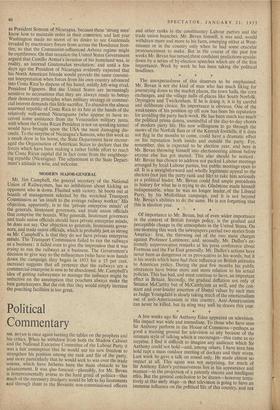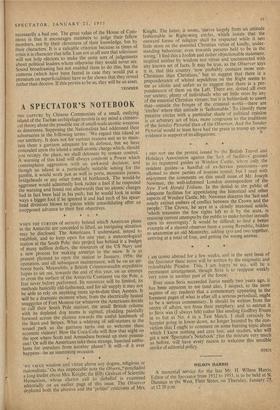Political Commentary
M. BEV,AN is once again turning the tables on the prophets and his critics. When he withdrew from both the Shadow Cabinet and the Na tonal Executive Committee of the Labour Party it was h fair assumption that he would use his new freedom to strengthen his position among the rank and file of the party, and more particularly that he would seek to win over the trade unions, which have hitherto been the main obstacle to his advancement. It was 4.1so forecast—plausibly, for Mr. Bevan is temperamentally averse to the hard grind of politics—that much of the necessary drudgery would be left to his lieutenants and through them to the Bevanite non-commissioned officers and other ranks in the constituency Labour parties and the trade union branches. Mr. Bevan himself, it was said, would withdraw more and more to his farm, emerging either at West- minster or in the country only when he had some oracular pronouncement to make. But in the course of the past few weeks Mr. Bevan has turned these confident predictions upside- down by a series of by-election speeches which are of the first importance. Week by week he has been taking the political headlines.
The unexpectedness of this deserves to be emphasised. Mr. Bevan is not the kind of man who has much liking for journeying down to the market places, the town halls, the corn exchanges, and the village halls of ,places like South Norfolk, Orpington and Twickenham. If he is doing it, it is by careful and deliberate choice. Its importance is obvious. One of the weaknesses of his position up till now has been his reputation for avoiding the party hack-work. He has been much too much the political prima donna, unmindful of the day-to-day chores of modern party life. His new willingness to go through the snows of the Norfolk flats or of the Kentish foothills, if it does not flag in the months to come, could have a dramatic effect on his reputation both inside and outside the party. For, remember, this is expected to be election year, and here is Mr. Bevan throwing himself into electioneering almost before anyone else has got started. This also should be noticed : Mr. Bevan has chosen to address not packed Labour meetings arranged by local Labour parties, but public meetings open to all. It is a straightforward and wholly legitimate appeal to the electors (not just the party rank and file) to take him seriously as a political leader. Mr. Bevan could find ample precedents in history for what he is trying to do. Gladstone made himself indispensable, when he was no longer leader.of the Liberal Party, by his Midlothian campaign, and it is not beyond Mr. Bevan's abilities to do the same. He is not forgetting that this is election year. * * *
Of importance to Mr. Bevan, but of even wider importance in the context of British foreign policy, is the gradual and perceptible change in the atmosphere in the United States. On one morning this week the newspapers carried two stories from America: first, the throwing out of the two main charges against Professor Lattimore; and, secondly, Mr. Dulles's ex- tremely unprovocative remarks at his press conference about Formosa and the Far East generally. Mr. Dulles's actions have never been as dangerous or as provocative as his words, but it is his words which have had their influence on British attitudes to American policy. During the past few months his public utterances have borne more and more relation to his actual policies. This has had, and must continue to have, an important effect in Britain. Secondly, the gradual deflation not only of Senator McCarthy but of McCarthyism as well, and the con- stant and ever-louder assertion of liberal values by such men as Judge Youngdahl is slowly taking much of the emotionalism out of anti-Americanism in this country. Anti-Americanism can never be killed, but its sting may well be drawn this year.
* * * A few weeks ago Sir Anthony Eden appeared on television. His impact was wide and immediate. To those who have seen Sir Anthony perform in the House of Commons—perhaps as good a training ground for television as any because of the intimate style of talking which it encourages—this came as no surprise. I find it difficult to imagine any audience which Sir Anthony could not hold—and, among others, I have seen him hold rapt a mass outdoor meeting of dockers and their wives. Last week he gave a talk on sound only. He made almost no impact at all. This again was not surprising, for much, of Sir Anthony Eden's persuasiveness lies in his appearance and mannerL-in the projectioh of a patently sincere and intelligent man. But the general conclusion to be drawn—however tenta- tively at this early stage—is that television is going to have an immense influence on the political life of this country, and not necessarily a bad one. The great value of the House of Com- mons is that it encourages members to judge their fellow members, not by their cleverness of their knowledge, but by their characters. It is a valuable criterion because in times of crisis it is character that tells2I am not at all sure that television will not help electors to make the same sort of judgements about political leaders whom otherwise they would never see. Sound broadcasting has not enabled them to do this, but the cameras (which have been feared in case they would put a premium on superficialities) have so far shown that they reveal rather than deceive. If this proves to be so, they will be an asset.
TRIMMER



































 Previous page
Previous page